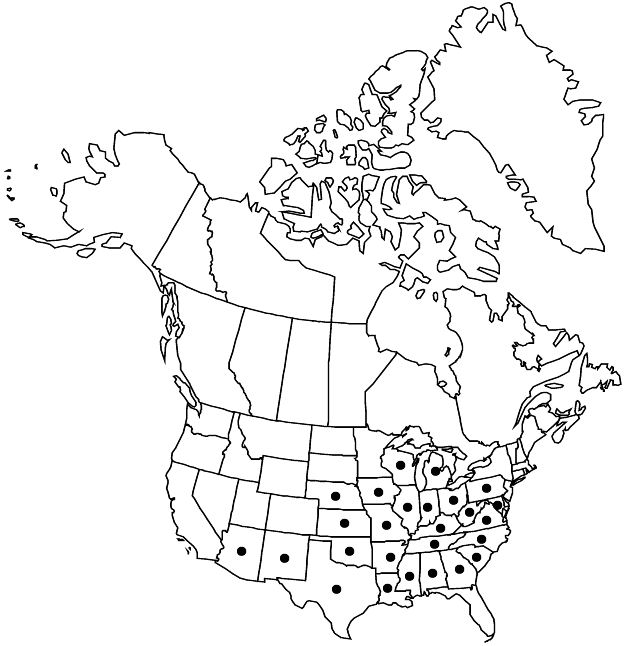Croton monanthogynus
Fl. Bor.-Amer. 2: 215. 1803. (as monanthogynum)
Herbs, annual, 2–5 dm, monoecious. Stems dichotomously branched from near base, stellate-hairy, some stellate hairs with dark brown centers. Leaves sometimes clustered near inflorescences; stipules glandlike, 0.1–0.3 mm; petiole 0.3–1.5 cm, glands absent at apex; blade ovate-oblong to nearly round (proximal) to narrowly elliptic (distal), 1–3.5 × 0.5–3 cm, base obtuse to rounded or truncate, margins entire, apex rounded to acute, abaxial surface pale green, sparsely whitish stellate-hairy and appearing brown-dotted, some hairs with dark brown centers, adaxial surface darker green, densely stellate-hairy, hairs without brown centers. Inflorescences bisexual or sometimes pistillate, congested racemes, 0.3–1 cm, staminate flowers 3–10, pistillate flowers 1–2(–5). Pedicels: staminate 0.5–2 mm, pistillate 1–2.5 mm (2–3 mm and recurved in fruit). Staminate flowers: sepals 3–5, 0.7–1 mm, abaxial surface stellate-hairy; petals 3–5, narrowly elliptic-oblanceolate, 0.7–1 mm, abaxial surface glabrous except margins villous; stamens 3–5. Pistillate flowers: sepals 5, subequal, 1.5–2 mm, margins entire, apex straight to slightly incurved, abaxial surface stellate-hairy, some hairs with dark brown centers; petals 0; ovary 2-locular, 1 fertile; styles 2, 0.8–1.2(–1.5) mm, 2-fid to base, terminal segments 4. Capsules appearing follicular (1-seeded), 3.5–4.5 × 1.8–2.2 mm, smooth; columella ± curved, apparently deciduous upon dehiscence of capsule. Seeds 2.5–3.3 × 2–2.5 mm, shiny. 2n = 20.
Phenology: Flowering May–Nov.
Habitat: Prairies, sandstone and limestone glades, thinly wooded bluffs, fallow fields, other disturbed habitats.
Elevation: 0–1000 m.
Distribution

Ala., Ariz., Ark., Ga., Ill., Ind., Iowa, Kans., Ky., La., Md., Mich., Miss., Mo., Nebr., N.Mex., N.C., Ohio, Okla., Pa., S.C., Tenn., Tex., Va., W.Va., Wis., Mexico (Coahuila, Nuevo León, San Luis Potosí, Tamaulipas).
Discussion
Croton monanthogynus may be adventive in the northernmost states.
Selected References
None.